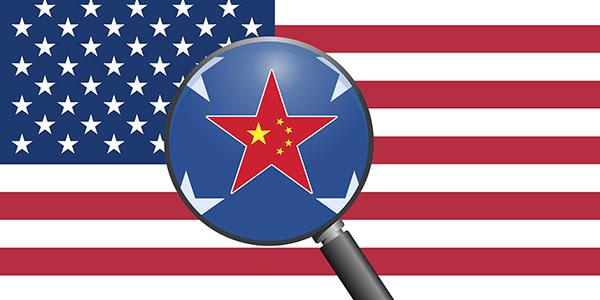Cyberthreat’s Most Effective Attack Vector Is the Economy
The greatest threat the United States faces is through cyber attacks on economic targets, and the worst adversary in this realm is China, according to the director of intelligence for the U.S. Cyber Command. Brig. Gen. Matteo Martemucci, USAF, J-2 for the Cyber Command, declared that China’s pilferage of intellectual property represents a major strike against the United States as part of the Middle Kingdom’s plan for global domination.
“I have long argued that one of the most significant long-term threats to U.S. national security is economic espionage—the large-scale theft of U.S. intellectual property—at the hands of the Chinese,” the general told a meeting of the AFCEA Cyber Committee. To support this point, he cited a recent paper penned by the Secretary of State Policy Planning Staff that tapped a report from the U.S. Trade Representative charging that China’s economic espionage constitutes “the greatest illegitimate transfer of wealth in human history, stealing technological innovation and trade secrets from companies, universities and the defense sectors of the United States and other nations.”
This cyber-enabled industrial espionage costs the U.S. economy about $600 billion annually, he continued. This figure is almost as much as the annual Defense Department budget, and it exceeds the total profits of the Fortune 500’s top 50 companies, he added.
The damage to the U.S. economy may go beyond measurable effects, Gen. Martemucci said. “While there are many examples of harm to specific companies and industries from IP [intellectual property] theft, it is more difficult to prove the opportunity cost, or the future lost opportunity for the American economy,” he offered. “I do not know how many future Mark Zuckerbergs, Steve Jobs, Henry Fords or Cheryl Sandbergs were denied their shot because of IP theft.
“What I do know is that even the lowest-end estimates of the loss that IP theft cost the U.S. economy is significant,” he stated, adding that policymakers need to treat this large-scale economic espionage in a manner commensurate with its importance.
And this economic subterfuge should be taken in the context of a great power confrontation, the general continues. In every historic conflict, with the possible exception of the Revolutionary War and the early 19th century conflicts, the United States has enjoyed economic overmatch with its enemy. But China’s economy is growing, and its gross domestic product is estimated by Reuters and the Centre for Economics and Business Research to be on track to exceed that of the United States by 2028. This provides them with a strong asset in global competition. “Their economic rise has been enabled in part by the large-scale cyber-enabled economic espionage,” Gen. Martemucci stated.
He offered as an analogy the Barbary Wars of 1800-1815. The independent Barbary states of Morocco, Tripoli, Algiers and Tunis “led the world in exploitation of global commerce” by attacking trade ships and demanding tribute for safe passage, he pointed out. These activities ran the gamut from theft to imprisonment of people for ransom, and wealthy trading nations such as France and Great Britain found it simpler to just pay off the pirates. But U.S. President Thomas Jefferson, realizing that his new nation was paying one-fifth of its annual income each year in tribute, sent the majority of the U.S. Navy’s combat power—four ships led by the USS Constitution—to the Mediterranean in what would become a 15-year war against piracy and privateering. Ultimately, this ended the tribute shakedown and guaranteed safe passage of commercial ships by the United States and its European trading partners.
This action more than 200 years ago also set the United States on a path of world leadership, Gen. Martemucci related. Its refusal to accept the status quo of piracy in the 19th century can be applied to the ongoing cybertheft of intellectual capital as it transits networks. “Cyberspace, as a man-made domain, is another ocean on which individuals, corporations and nation-states create commerce and conduct global trade,” he said.
Describing these parallels as “striking,” the general said, “Foreign cyber pirates and privateers, backed by their state governments, are taking over the modern cyber equivalents of those merchant ships, their ports and their transit routes. They conduct computer network exploitation with the support of their governments, routinely looting from American ships of commerce in cyberspace, while our military’s cyber warships are still under construction or, at best, protect only the military ports in which they remain moored.”
Gen. Martemucci called for a broad debate on roles and responsibilities for both government and the private sector. This must go far beyond the consequences of a potential “Armageddon-like cyber shutdown,” he posited. The public is largely focused on devastating major cyber attacks while generally overlooking the long-term damage to U.S. economic well-being. Its consequences could be far greater than attacks on different segments of cyberspace.
“Protection from cyber economic espionage merits serious consideration beyond the simplistic division of the Internet into separate spaces for the military, government, industry and academia to develop and defend—or not defend—in their own ways,” the general declared.
Gen. Martemucci elaborates on the requirements for this debate in a separate interview in the March 2021 issue of SIGNAL Magazine.




Comments